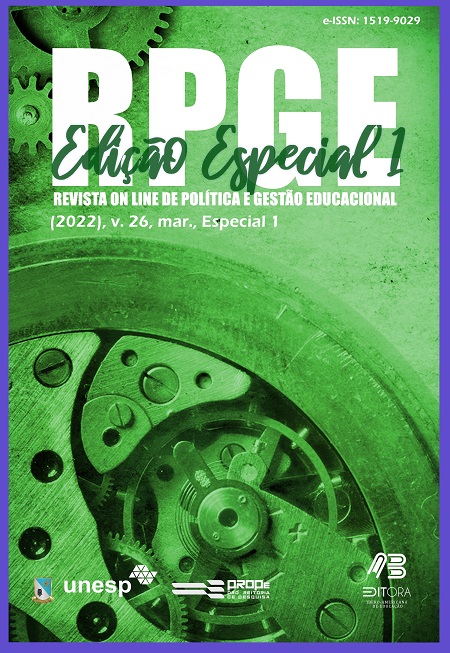Beyond the discourse of post-truth
Some reflections on the idea of fake news based on corpus linguistics (an educational analysis)
DOI:
https://doi.org/10.22633/rpge.v26iesp.1.16508Keywords:
Fake news, Journalism education, Post-truth, Corpus linguistics, MediaAbstract
The study aims to go to beyond the discourse of post-truth: some reflections on the idea of fake news based on corpus linguistics (an educational analysis). Seeking to illustrate how we deceive ourselves by attempting to understand fake news through the notion of a post-truth society. We argue that both the concepts of fake news and post-truth are not an aberration to the history of media practices, neither are they of contemporary origins. They are an intricate part of the discursive practices in which media as an institution engages. The article builds on Foucault’s approach to discursive practices and applies a meta-discursive framework to trace the genealogy of post-truth and fake news in an Indian context. The article also offers a critical reflection on some of the key strategies to contain and counter fake news. For instance, media literacy and linguistic approaches such as corpus linguistics to detect fake news.
Downloads
References
BALL, J. Post Truth: How Bulshit Conquered the World. London: Biteback Publishing, 2017.
BHASKARAN, H.; MISHRA, H.; NAIR, P. Contextualizing Fake News in Post-Truth Era: Journalism Education in India. Asia Pacific Media Educator, v. 27, n. 1, p. 41–50, 2017. DOI: 10.1177/1326365X17702277
BHASKARAN, H.; MISHRA, H.; NAIR, P. (Journalism Education in Post-Truth Era: Pedagogical Approaches Based on Indian Journalism Students’ Perception of Fake News. Journalism & Mass Communication Educator, v. 74, n. 2, p. 158–170, 2019.
CONCHA, P. Macron: We must fight ‘ever-growing virus of fake news’. The Hill, 25 Abr. 2018. Available: https://thehill.com/homenews/media/384820-macron-we-must-fight-ever-growing-virus-of-fake-news/. Access: 22 Oct. 2021.
CORNER, J. Fake news, post-truth and media–political change. Media, Culture & Society, v. 39, n. 7, p. 1100–1107, 2017.
CROUCH, C. Post- democracy. Polity Books, Cambridge, 2004.
LEVINSON, P. Fake News in Real Context, Middletown, D.E: Connected Editions, 2017.
JOHAN, F.; JANNICK, S. Post- Truth, Fake News and Democracy: Mapping the Politics of Falsehood. Routledge, 2019.
FARKAS, J.; SCHOU, J. Post-Truth Discourses and their Limits: A Democratic Crisis? In: Disinformation and Digital Media as a Challenge for Democracy. 1. ed. 2020. p. 103–126.
HARJUNIEMI, T. Post-truth, fake news and the liberal ‘regime of truth’ – The double movement between Lippmann and Hayek. European Journal of Communication, v. 8, p. 169-177, 2021.
HERMAN, E. S. Manufacturing Consent: The Political Economy of the Mass Media. New York: Pantheon Books, 1988.
JONATHAN, R. Brexit, Trump, and Post-Truth Politics, Public Integrity, v. 19, n. 6, p. 555-558, 2018. DOI: 10.1080/10999922.2017.1285540
JONES-JANG, S. M.; MORTENSEN, T.; LIU, J. Does Media Literacy Help Identification of Fake News? Information Literacy Helps, but Other Literacies Don’t. American Behavioral Scientist, v. 65, n. 2, p. 371–388, 2021.
KRASNI, J. How to hijack a discourse? Reflections on the concepts of post-truth and fake news. Humanit Soc Sci Commun, v. 7, n. 32, 2020.
ANCONA, M. D’. Post Truth: the new war on truth how to fight back. UK: Random House, 2017.
PETERS, M. A. Truth and truth-telling in the age of Trump, Educational Philosophy and Theory, v. 50, n. 11, p. 1001-1007, 2018.
RABIN-HAVT, A. Lies, incorporated: The world of post-truth politics. New York: Anchor Books, 2016.
RASHKIN, H.; CHOI, E.; JANG, J. Y.; VOLKOVA, S.; CHOI, Y. Truth of varying shades: Analyzing language in fake news and political fact-checking, 2017.
RICHARDSON, N. Fake News and Journalism Education. Asia Pacific Media Educator, v. 27, n. 1, p. 1–9, 2017. DOI: https://doi.org/10.1177/1326365X17702268
SAINATH, P. Reaping Gold through Cotton, and Newsprint. The Hindu, 2012. Available: https://www.thehindu.com/opinion/columns/sainath/reaping-gold-through-cotton-and-newsprint/article3401466.ece. Access: 22 Oct. 2021.
TIWARI, A. Indian media is an upper caste fortress, suggests report on caste representation. Newslaundry, 2019. Available: https://www.newslaundry.com/2019/08/02/caste-representation-indian-newsrooms-report-media-rumble-oxfam-india
WILSON, S. Pre-truth, post-truth and the present: jacques lacan and the real horror of contemporary knowledge. In: OVERELL, R.; NICHOLLS, B. (Eds.). Post-Truth and the Mediation of Reality. Palgrave Macmillan, Cham, 2019.
Published
How to Cite
Issue
Section
License
Copyright (c) 2022 Revista on line de Política e Gestão Educacional

This work is licensed under a Creative Commons Attribution-NonCommercial-ShareAlike 4.0 International License.
Manuscritos aceitos e publicados são de propriedade da Revista on line de Política e Gestão Educacional. É vedada a submissão integral ou parcial do manuscrito a qualquer outro periódico. A responsabilidade do conteúdo dos artigos é exclusiva dos autores. É vedada a tradução para outro idioma sem a autorização escrita do Editor ouvida a Comissão Editorial Científica.











